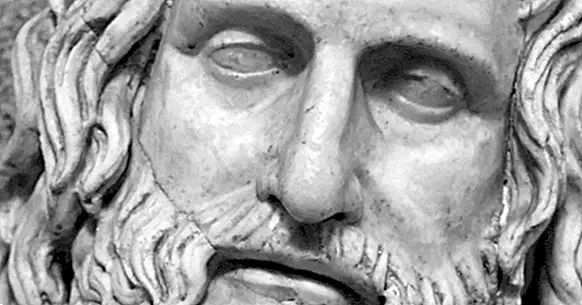The relativistic theory of Protagoras
Plato may be one of the most famous Greek philosophers in history, but his way of thinking he did not represent all the Athenian intellectuals that populated that Mediterranean power during the 5th century BC C. Protagoras, the best known of the Sophist philosophers, embodies a way of understanding reality diametrically opposed to the one defended by the disciple of Socrates.
In this article we will see what it was that characterized the philosophy of Protagoras and how was his way of thinking based on relativism .
- Related article: "How are Psychology and Philosophy alike?"
Who was Protagoras?
This well-known philosopher was born in Abdera, in the north of Greece, although he lived traveling a lot, something typical of the men with an intellectual profile who lived during the era of Hellenic splendor. At the time when Pericles directed the city-state of Athens, Protagoras was his adviser and adviser, and even, at the governor's request, drafted the constitution of a Greek colony.
Having lived so long ago, not much is known about the personal details of his life. Yes, their intellectual positions are known, given that Plato devoted a lot of effort to refute his arguments in his books , as we will see.
- Maybe you're interested: "The myth of Plato's cave"
The relativistic theory of Protagoras
The fundamental and basic aspects of the theory of Protagoras, based on an explicitly relativistic way of thinking , are the following.
1. The function of philosophy is not to access absolute truths
Protagoras believed that every affirmation is conditioned by the context in which it is issued. This means that it can not translate universal truths into words, given that it is always limited by the time and place in which it has been generated, either due to the lack of information about something or the lack of objectivity of the person who supports the affirmation, who is often involved personally and emotionally in the debate.
In the same way, the context also affects the way in which the statement is interpreted, and can have totally opposite meanings depending on where it is used.
2. There are as many points of view as people
Every human being sees things in their own way, given that our past and our life trajectories are unique and clearly distinguishable from the rest. In the same subject of discussion, it is always possible to find many people who think differently from everyone else. Although we resemble each other, we tend to differ in many aspects.
3. What is true is decided by each one
From the above it follows that there are many truths , valid for certain people and not so much for others, and that that can not be avoided, whatever we do.
4. Philosophy must convince
Since we can not agree on absolute truths, the philosopher's task is to make the ideas he defends sound convincing, not that they are (since we can not imagine something that is universally valid, which for Protagoras would imply is valid for all.
So, the intellectual must think more about the effects of launching an affirmation than in the veracity of that statement. This will make the speech that is defended seductive and attract the sympathy of many people.
The role of the Sophist philosophers
The former point is something shared by a type of philosophers called sophists. The sophists were advisers and advisers who trained the most influential men in Greece in the art of rhetoric , which made a lot of sense in Athens. In this city-state, democracy consisted mainly in knowing how to defend certain ideas in assembly, for which a large part of intellectual life was oriented towards politics.
Thus, Protagoras and many other sophists benefited from this form of government to teach the most useful speech and prosody techniques, capable of making a bad argument seem good in the eyes of others.
This was much criticized by both Socrates and his disciple, Plato, as both believed in the existence of universal truths. The implications of Protagoras' work came to say that behind reality there is no universal structuring truth of everything that exists, only certain ways of ordering ideas and words to make them sound good and fit with the way of thinking of oneself. Hence, this intellectual position is called relativism: everything is relative and only opinions matter (or, more accurately, both opinions and who holds them).
Currently relativism continues to exist , although the sophists disappeared with Ancient Greece.The defenders of this current in the XX and XXI century are fundamentally defenders of the postmodern conception of reality, according to which we must recognize that there are different stories about what exists and these must live together.



















